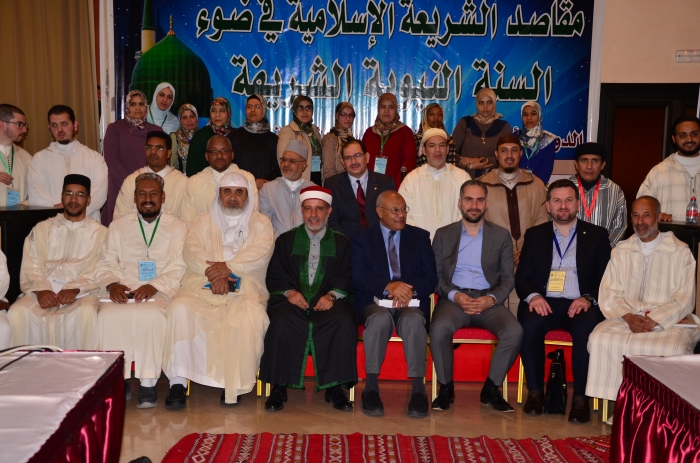Among the recommendations arising from the training course, “Objectives (Maqāṣid) of the Noble Qurʾān (3)” included organising a course to specifically tackle the objectives of the Noble Prophetic Sunnah. In implementing these recommendations, a training course was convened titled “Objectives (Maqāṣid) of Islamic law in light of the Noble Prophetic Sunnah: Methodology of understanding the Sunnah and its objectives”. It was held on 2-4 May 2018CE (16-18 Sha‘bān 1439AH) at the Faculty of Letters & Humanities, Moulay Ismail University in Meknes. The course was supervised by the Centre for the Study of the Philosophy of Islamic Law, belonging to Al-Furqān Islamic Heritage Foundation in London, in collaboration with the Maqāṣid Research & Studies Centre (Rabat), and in coordination with the Islamic Sciences & Urban Studies Laboratory and Maliki Jurisprudence & Dispute Management Masters, both affiliated to the Faculty of Letters & Humanities in Meknes.
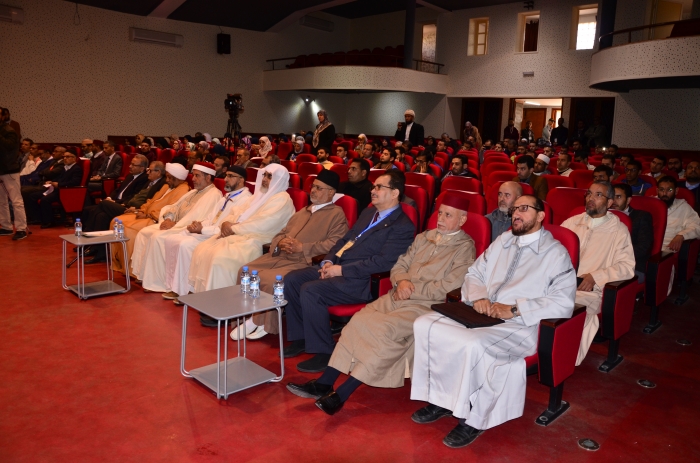
Around 100 researchers, male and female, travelling from as far as Tunisia, Algeria, Egypt, Qatar, Saudi Arabia, England, and from within Morocco, benefitted from the course. Instruction was led by erudite scholars and experts in the philosophy of Islamic law (maqāṣid) domain, who enriched it with enlightened submissions and insightful contributions; all distinguished by deep reflection, sound opinion, refined thinking, and robust approaches.
The course began on Wednesday morning, 2 May 2018 (16 Sha‘bān 1439AH) at the Faculty of Letters & Humanities in Meknes with an inaugural session chaired by Dr Fouad Mihdad.
After an opening recitation from the Noble Qur’ān, representatives of the institutions organising the course welcomed the lecturers and delegates. Speeches were delivered in turn by the Dean of Faculty of Letters & Humanities, the President of Meknes Commune Council, the Managing Director of Al-Furqān Islamic Heritage Foundation, his counterpart, the Director of the Maqāṣid Research & Studies Centre (Rabat), the Assistant Director of the Islamic Sciences & Urban Studies Laboratory, and finally, Professor Mohammed Salim al-Awwa, speaking on behalf of the esteemed course leaders.
At the conclusion of the opening session, the Managing Director of Al-Furqān Islamic Heritage Foundation presented awards shields to the Dean of Faculty of Letters & Humanities, and the President of Meknes Commune Council, respectively. The Dean of Faculty of Letters & Humanities reciprocated by presenting shields to both the Managing Director of Al-Furqān Islamic Heritage Foundation, and the Director of the Maqāṣid Research & Studies Centre (Rabat), in celebration of this significant scientific event, and as token of mutual academic appreciation.
In the evening of the same day, an introductory session chaired by Dr Mohammed Ansari on the topic of “Objectives of the Noble Sunnah, and their relationship to the objectives of the Noble Qur’ān and philosophy of Islamic law (maqāṣid al-sunnah al-sharīfah wa ‘ilāqatuhā bi maqāṣid al-qur’ān al-karīm wa maqāṣid al-sharī‘ah)” marked the start of the closed course sessions. The topic was inaugurated by both Dr Mohammed Salim al-Awwa, and Dr Ahmad Raissouni. They highlighted the course’s context and objectives, and the topicality and importance of issues addressed, in meeting the Muslim nation’s vital needs. Indeed, integrity of thinking leads to integrity of expression, while integrity of both thinking and expression are the foundation of integrity of behaviour and conscious action. For this and other purposes, the words of the course title were carefully crafted, namely “Methodology of understanding the Sunnah and its objectives (manhajiyyat fahm al-sunnah al-nabawiyyah al-sharīfah wa maqāṣiduhā)”.
Subsequently, the second session chaired by Professor al-Sharif Hatem al-Awni began with the participation of Professor Nouredine Khadimi, who addressed the topic of objectives-based Sunnah (al-sunnah al-maqāṣidiyyah). He disambiguated the concept of objectives-based Sunnah, and expanded on its grounding rules, such as complete adherence to the way of the Prophet, peace be upon him, in his different acts and behaviours. He then spoke on the matter of objectives-based Sunnah as a base of evidence applying the methodology of referring to textual evidence (ta’ṣīl), linking to basic principles (taq‘īd), and finally codification (tadwīn).
Following clarification and referral to textual evidence, Professor Issam al-Bashir delivered his comments on this submission, expressing his reservations about the title, and indeed, the distinction made between the levels of objectives in the Sunnah. He drew attention to the fact that the Sunnah possessed its own unique objectives as did the Noble Qur’ān. He alluded to some of the Sunnah’s objectives, such as love (maḥabbah), elucidation (bayān), emulation (ta’asī) whether in visible or internalised, teaching (ta‘līm), etc.
Staying in the vicinity of this textual evidence base, and with the aim of defining the relationship binding the two classes of revelation in establishing the objectives of sending revelation, Dr Abdallah al-Tahiri delivered his paper, titled “the relationship between Qur’ān and Sunnah in light of the supreme legal objectives in the Prophetic Sunnah (al-‘ilāqah bayn al-qur’ān wa al-sunnah ‘alā ḍū’ al-maqāṣid al-shar‘iyyah al-kubrā li al-sunnah al-nabawiyyah)”. He highlighted the relationship between the Noble Qur’ān and the Sunnah, in that both were Revelation obliging strict adherence in practice. Moreover, he drew attention to the necessity of distinguishing between two aspects that define this relationship, namely the aspect of establishment (thubūt), inimitability (i‘jāz), and ritual worship (ta‘abud), where the Qur’ān has precedence, and the aspect of inductive reasoning (istidlāl), deductive reasoning (istinbāṭ), and evidencing (istishhād), where both share equal status.
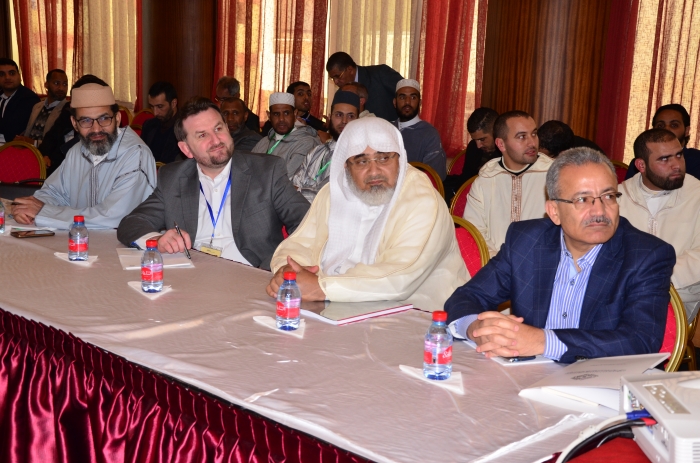
Dr Lakhlafah Mutawakil, the commentator, emphasised the position articulated by legal theorists (al-uṣūliyyūn) in ranking the Qur’ān before the Sunnah, which in no way diminishes the stature of the Sunnah.
After the tea break, the course resumed with a session chaired by Dr Abdul Majid al-Najjar comprising two papers, whose scope of enquiry related to exploring the nature of the Sunnah that formed the basis of jurisprudential rulings (aḥkām), and also the derivation of objectives. Moreover, those aspects of objectives-based reasoning that could be employed in verifying the Sunnah text, and the level assigned to the narration (riwāyah), from the perspective of acceptance(al-i‘tibār).
The first paper by Dr Naji Lamine titled “Ranks of Prophetic acts (maqāmāt al-ṭaṣarufāt al-nabawiyyah)” framed the topic. He concluded that the fundamental basis for the actions of the Prophet, peace be upon him, was conveying (al-tablīgh) the Divine Message. He then addressed some of the Prophetic actions, such as dispensing justice in the function of judge, and public political administration in accordance with Islamic law (al-siyāsah al-shar‘iyyah). He identified the rules for distinguishing between Prophetic actions with the purpose of examining the tradition (ḥadīth), before attempting to derive rulings from it. He proposed changing the term “legislative Sunnah (al-sunnah al-tashrī‘iyyah)” to “general legislation (al-tashrī‘ al-‘ām)” in contrast to the specific (khāṣ), since the Sunnah in totality is legislation.
Professor Mohammad Salim Al-Awwa commented upon the paper pointing out the ambiguity in the concept, and warning that some of the meanings mentioned had been quite narrowly understood, while advising researchers to review previous studies.
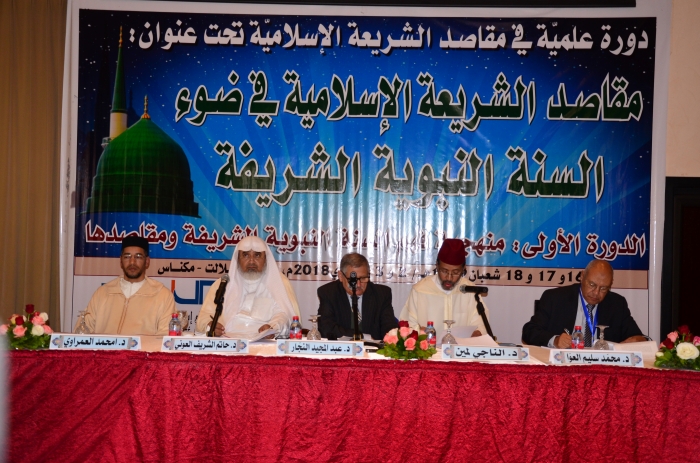
The paper presented by Professor al-Sharif Hatim al-Awni was titled “objectives-based reasoning, its rules, and its effect in establishing the ḥadīth narration and its interpretation (al-nażar al-maqāṣidī wa ḍawābituh, wa athahrahū fī ithbāt al-riwāyah al-ḥadīthiyyah wa ta’wīlihā)”. It raised two significant challenges; one related to the extent to which it was possible to grant greater priority to objectives-based reasoning over the text (naṣ). The other related to the effective cause (‘ilah) of ritual worship in those areas outside ritual worship (‘ibādāt). In order to present a convincing argument, he articulated the challenge of applying and also neglecting objectives-based reasoning in accepting, rejecting, interpreting, and understanding the Sunnah. In this context, he gave examples and cases, which he considered to signify rejection of traditions (ḥadīth) on the presumption that these contravened the objectives.
Dr Imhammad al-Amrawi commented on this submission, drawing attention to the flaw in the general understanding of some concepts forming the basis of the paper and shaping its perspective. In this respect, he pointed to an existing confusion between general principles (al-qawā‘id al-āmah) and the objectives (maqāṣid). He highlighted aspects of this flaw by reviewing some of the examples and cases presented in the paper as evidence for his view. These he judged as failing to meet the conditions required to be taken as credible in indicating the intended. Subsequently, the session chairman opened the opportunity for comment and discussion.
On Thursday morning, 3rd May, the course resumed with the 4th scientific session chaired by Professor Al-Awwa. Two papers were presented followed by two critical commentaries.
The first paper by Professor Ahmad Raissouni was titled “the cases relating to individuals, indications, attributes, and objectives (qaḍāyah al-a‘yān, dalālatuhā, ṣifātuhā, maqāṣiduhā)”. He began by discussing the concept of individual cases, and the aim of investigation in this area. He gave examples, illustrating the areas where scholars had agreed or differed. He concluded with specific determinants that identify these individual cases.
Dr Omar Jidayah commented on this paper praising its content, and drawing attention to the importance of making a distinction between individual cases and cases relating to circumstances. He also added some rules to the paper.
The second paper titled “prioritising actions over Prophetic tradition: an objectives-based perspective (taqdīm al-‘amal ‘alā al-ḥadīth: ru’yah maqāṣidiyyah)” was presented by Dr Moutaz al-Khatib. In his paper, he attempted to demonstrate and to defend a principal thesis, namely the necessity to prioritise actions over statements, where the shortcomings of partial indicants (al-adilah al-juz’iyyah) would be overcome by moving from Prophetic tradition transmitted by a single narrator (āḥād) to prevailing action, which represents an actual consensus (ijmā‘). He based this on the work of legal theorists, most prominently al-Imām-Shāṭibī.
Dr Ibrahim Bayoumi Ghanem commented on the paper, noting that the objectives-based conceptualisation of the paper required further exploration and review.
Following a tea break, the course continued with the 5th session chaired by Dr Mohammad al-Ansari. Two papers were presented, namely:
The first: “the objective of custom in the Sunnah of the best of mankind (qaṣd al-i‘tiyād fī sunan khayr al-‘ibād)” by Dr Fouad Bougjij. He defined the term “custom (i‘tiyād)”, its relationship with the Noble Prophetic Sunnah, function in obligatory matters (taklīf), and its objectives, given that the Prophetic traditions can only result in good. He concluded that the objective of custom achieves the objective of becoming closer to the Creator “taqarub”, and that the Sunnah was a protection from falling into error.
Dr Hussain al-Mus commented on the submission, giving explanation and advice. He also added that traditions were also subject to the five rulings.
The second: “Application is an objective of the Prophetic Sunnah (al-tanzīl maqṣad li al-sunnah al-nabawiyyah)” by Dr Abdul Majid al-Najjar. He raised the issue of applying (tanzīl) the Sunnah, and the resultant complex problems. He exerted effort in proposing a set of rules to assist in avoiding some errors in implementation; for example, taking account of some personal specificities, circumstantial specificities, natural custom, inherited customs, and future foresight.
Dr Lakhdar al-Khadari commented on the paper, praising it, offering expanded treatment in explanation and projection of themes.
Following the lunch break and Dhuhr prayers, the course continued with the 6th session chaired by Dr Ibrahim Bayoumi Ghanem, where two papers were presented:
The first: “The dialectic of jurisprudence and Prophetic tradition, and its influence on comprehending the objectives of the Prophetic Sunnah (jadaliyyat al-fiqh wa al-ḥadīth wa athaharah fī fahm maqāṣid al-sunnah al-nabawiyyah)” presented by Dr Ibrahim Bourshasin. In his thesis, he highlighted that the objectives of the Prophetic Sunnah would not have been articulated without the methodological and epistemological integration resulting from the historical reconciliation between theology (‘ilm al-kalām), Prophetic tradition (ḥadīth), jurisprudence (fiqh), Sufism (taṣawwuf) and philosophy. This reconciliation represented the fundamental condition for the discipline of objectives of the Sunnah to be established.
Dr Abdallah Hilali commented on the paper drawing attention to its content, suggesting enriching the topic with the addition of examples of traditionist scholars (muḥadīthūn).
The second: “Applying the Islamic law universals to understanding the Prophetic Sunnah (i‘māl al-kuliyyāt al-shar‘iyyah fī fahm al-sunnah al-nabawiyyah)” by Dr Mohammad Awwam. He defended his thesis on the necessity of applying the Islamic law universals to understanding the Prophetic Sunnah.
Dr Abdel Qader Tahiri commented on the paper offering a critical review, and explanation, while drawing attention to the need for additional attributes to the universalities, and further elements to their conceptualisation.
At the end of the session, Professor Issam al-Bashir expanded on, and illustrated the wide scope and horizons existing for work in the subject area of the objectives of the Prophetic Sunnah.
On Friday morning, 4th May, the last day of the training course, the 7th session was convened, chaired by Mr Sali Shahsivari. It comprised an open dialogue with the esteemed Professors: Mohammad Salim al-Awwa, Ahmad Raissouni, Abdul Majid al-Najjar, and al-Sharif Hatim al-Awni. They enriched the discussion with enlightened understanding, fine conceptualisation, and responses to questions that were marked by providing guidance and foresight; indeed, focusing on the necessity to comprehend the needs of the time and acquire deep understanding of the Sunnah, as well as requiring alertness in defending, and applying it in contemporary reality.
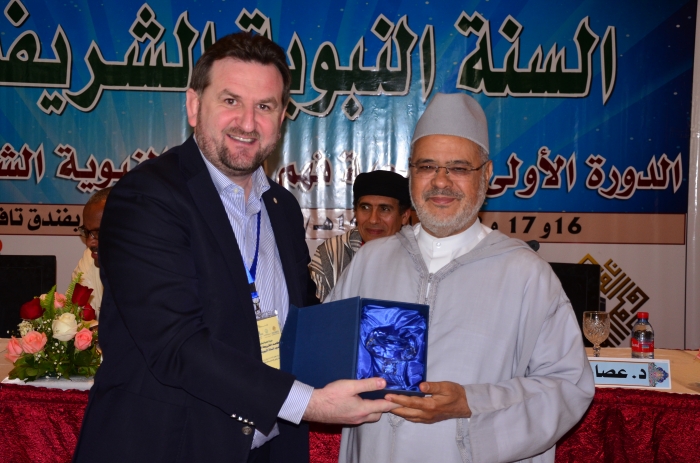
The closing session chaired by Dr Omar Jidayah witnessed expressions of gratitude and appreciation from the bodies organising the training course to all those who had contributed to its success. Following a reading of the final statement, and the results and recommendations of the course, the session was crowned with the award of certificates to the participants, coming to an end with a recitation from the Noble Qur’ān.
Recommendations
- Focus on the issues and problematic matters relating to understanding regarding application of the Noble Prophetic Sunnah.
- Surveying and compiling all the cases relating to individuals, while linking these to the reality of application of Revelation, in order to extract the governing rules and principles, in theory, codification, and application.
- Expanding the treatment, where universals (kuliyyāt) are used to judge many traditions (ḥadīth) that have been understood in a piecemeal manner. This allows us to engage in fresh study, in terms of understanding and application.
- Preparing a special guide to the Islamic law universals from the Sunnah.
- Organising a training course on: “objectives and their relationship to the jurisprudence of momentous events referral to textual evidence and application (al-maqāṣid wa ‘ilāqatuhā bi fiqh al-nawāzil ta’ṣīlan wa taṭbīqan)”, with concern for the aspects relating to laying the foundations for the objectives-based jurisprudence in momentous events, by stipulating thematic areas related to the Mailikī school and others’ heritage on momentous events, i.e. “nawāzil”.
- Focus on the methodology of applying the Prophetic Sunnah on contemporary reality, according to objectives-based reasoning.
- Holding workshops parallel to the training course to study and discuss related key scientific issues.
- Holding a training course related to the Islamic law objectives in managing public affairs.
- Holding a training course related to the Islamic law objectives in light of the traditions of the pious predecessors (al-salaf).
- Promoting the execution of an objectives-based exegesis of the Prophetic Sunnah, in the same vein as other exegesis works, with the aim of highlighting the objectives in the Prophetic tradition.
- Coordinating with specialist research centres that share the same scientific concerns as the course organising bodies.
